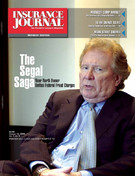Illinois’ insurance regulatory environment has long been viewed by the industry and business community as the model for other states to emulate, and rightfully so.
While every state or region has unique problems in certain markets, Illinois’ open and competitive rating system has served our clients, individuals and businesses extremely well over the past three decades. One only needs to look at the number of insurers admitted and writing business in this state and the number of producers and agencies distributing their products as evidence of the healthy market climate in Illinois.
The benefits of this experience are not lost on the Professional Independent Insurance Agents of Illinois and our 1,500 member agencies. The PIIAI has worked with the Illinois Department of Insurance to adopt the National Association of Insurance Commissioners’ Model Producer Licensing Act, measures to related to the Gramm-Leach-Bliley Act and repeal the state’s countersignature law.
In all of these proactive measures, Illinois’ independent agents recognized the importance of an increasingly national and international marketplace and set aside parochial concerns for the betterment of our marketplace.
Unfortunately, there are several dynamics currently in play which may conspire to undermine the advances we have made, leading to a deteriorating Illinois marketplace, lending credence to those who advocate a greater role for the federal government in the regulation of insurance, and ultimately creating doubt among insurers as to the benefits of Illinois as their state of domicile.
The prolonged downturn in the state economy and the resulting budget deficit has led to the budget equivalent of the perfect storm in Illinois. One of the last acts of the prior gubernatorial administration was an early retirement program which resulted in about one quarter of the DOI staff walking out the door on Jan. 1, 2003. Add to the mix a new administration with a $4 billion to $5 billion deficit and a pledge not to raise general income or sales taxes, and a constituency base demanding additional spending on social services.
With no new revenue to hire additional staff, the positions at DOI were left vacant and as a result, Illinois’ backlog of financial audits of insurers was increased even further. This has led to a review of Illinois’ accreditation by the NAIC, which if suspended or revoked, could lead to serious consequences for our domestic industry. Additionally, the new administration doubled literally every fee and penalty in the insurance code, established a new tax on workers’ compensation policies, doubled the motor-vehicle report fee and eliminated several tax offsets and credits.
While reasonable tax and fee increases are not unwarranted if used to fund the operations of the DOI, the administration makes matters worse by diverting all the new revenue and more from the two DOI-dedicated funds into the state’s general revenue fund, which pays for general state services including the Human Services and Public Aid departments. Thus, with the exception of a few recently hired financial auditors, the DOI is unable to fill any of the vacant positions and several additional DOI functions have become backlogged.
Looking forward to 2004, absent a miraculous turnaround in the state economy or a change in the administration’s pledge on income and sales taxes, the business community, including insurance, is bracing for another round of potentially devastating tax and fee increases.
Combine this with the trial bar’s legislative agenda and a medical malpractice market already in crisis, and you have the economic equivalent of the perfect meteorological storm. Employers leaving the state at an accelerated pace means fewer businesses and employees to insure. Fewer insureds and an unfavorable tort climate lead more insurers to leave the Illinois marketplace. Fewer employers (including insurers, Illinois’ second largest employer) leads to further reductions in revenues and less competition in the insurance market and on and on.
While I am hopeful we can avoid such a scenario, it can and will happen unless the administration and state legislators avoid the temptation to saddle the business community with another round of tax and fee increases and reject several pending changes to Illinois tort law.
Hopefully, with a rebound in the economy and reductions in the real cost drivers in the state budget (in fiscal year 2004 budget, the administration and General Assembly approved about $1 billion in new spending) Illinois can avoid the perfect storm and navigate its way into better waters.
If not, a marketplace that has served Illinois consumers well and saved them significant premium dollars will become a mere footnote in the annals of insurance regulation.
Brian McSherry is president of PIIAI and an agent with Huxtable Insurance Agency Inc. in Flanagan, Ill.
Topics Trends Agencies Legislation Illinois
Was this article valuable?
Here are more articles you may enjoy.


 Allstate Doubles Q4 Net Income While Auto Underwriting Income Triples
Allstate Doubles Q4 Net Income While Auto Underwriting Income Triples  Florida’s Commercial Clearinghouse Bill Stirring Up Concerns for Brokers, Regulators
Florida’s Commercial Clearinghouse Bill Stirring Up Concerns for Brokers, Regulators  Trapped Tesla Driver’s 911 Call: ‘It’s on Fire. Help Please’
Trapped Tesla Driver’s 911 Call: ‘It’s on Fire. Help Please’  Q4 Global Commercial Insurance Rates Drop 4%, in 6th Quarterly Decline: Marsh
Q4 Global Commercial Insurance Rates Drop 4%, in 6th Quarterly Decline: Marsh 


